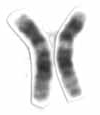Short-chain acyl-coenzyme A dehydrogenase deficiency
(Redirected from Short-chain acyl-CoA dehydrogenase deficiency)
Editor-In-Chief: Prab R Tumpati, MD
Obesity, Sleep & Internal medicine
Founder, WikiMD Wellnesspedia &
W8MD medical weight loss NYC and sleep center NYC
| Short-chain acyl-coenzyme A dehydrogenase deficiency | |
|---|---|

| |
| Synonyms | SCAD deficiency |
| Pronounce | |
| Specialty | Medical genetics |
| Symptoms | Hypoglycemia, lethargy, muscle weakness, failure to thrive |
| Complications | N/A |
| Onset | Infancy or early childhood |
| Duration | Lifelong |
| Types | N/A |
| Causes | Mutations in the ACADS gene |
| Risks | |
| Diagnosis | Genetic testing, newborn screening |
| Differential diagnosis | Medium-chain acyl-coenzyme A dehydrogenase deficiency, Glutaric acidemia type II |
| Prevention | |
| Treatment | Dietary management, avoidance of fasting |
| Medication | |
| Prognosis | Variable, can be managed with treatment |
| Frequency | Rare |
| Deaths | |
Short-chain acyl-coenzyme A dehydrogenase deficiency (SCADD) is a rare metabolic disorder that affects the body's ability to break down certain fatty acids into energy. This condition is part of a group of disorders known as fatty acid oxidation disorders.
Causes
SCADD is caused by mutations in the ACADS gene, which provides instructions for making an enzyme called short-chain acyl-CoA dehydrogenase. This enzyme is involved in the breakdown of short-chain fatty acids. Mutations in the ACADS gene lead to a deficiency of this enzyme, resulting in the accumulation of fatty acids and their byproducts in the body.
Symptoms
The symptoms of SCADD can vary widely among affected individuals. Some people with SCADD may remain asymptomatic, while others may experience:
- Hypoglycemia (low blood sugar)
- Lethargy
- Poor feeding
- Vomiting
- Seizures
- Developmental delay
Diagnosis
SCADD is typically diagnosed through newborn screening programs that test for elevated levels of certain metabolites in the blood. Further diagnostic tests may include:
- Genetic testing to identify mutations in the ACADS gene
- Urine organic acid analysis
- Acylcarnitine profile
Treatment
Management of SCADD often involves dietary modifications to avoid fasting and to ensure a steady supply of energy. This may include:
- A high-carbohydrate, low-fat diet
- Frequent meals and snacks
- Supplementation with carnitine
Prognosis
The prognosis for individuals with SCADD is generally good, especially if the condition is detected early and managed appropriately. Many individuals with SCADD lead normal lives with few or no symptoms.
See also
References
External links
- National Human Genome Research Institute - SCADD
- Genetic and Rare Diseases Information Center - SCADD
| Metabolic disorders | ||||||||||
|---|---|---|---|---|---|---|---|---|---|---|
This metabolic disorder related article is a stub.
|
Transform your life with W8MD's budget GLP-1 injections from $125.
W8MD offers a medical weight loss program to lose weight in Philadelphia. Our physician-supervised medical weight loss provides:
- Most insurances accepted or discounted self-pay rates. We will obtain insurance prior authorizations if needed.
- Generic GLP1 weight loss injections from $125 for the starting dose.
- Also offer prescription weight loss medications including Phentermine, Qsymia, Diethylpropion, Contrave etc.
NYC weight loss doctor appointments
Start your NYC weight loss journey today at our NYC medical weight loss and Philadelphia medical weight loss clinics.
- Call 718-946-5500 to lose weight in NYC or for medical weight loss in Philadelphia 215-676-2334.
- Tags:NYC medical weight loss, Philadelphia lose weight Zepbound NYC, Budget GLP1 weight loss injections, Wegovy Philadelphia, Wegovy NYC, Philadelphia medical weight loss, Brookly weight loss and Wegovy NYC
|
WikiMD's Wellness Encyclopedia |
| Let Food Be Thy Medicine Medicine Thy Food - Hippocrates |
Medical Disclaimer: WikiMD is not a substitute for professional medical advice. The information on WikiMD is provided as an information resource only, may be incorrect, outdated or misleading, and is not to be used or relied on for any diagnostic or treatment purposes. Please consult your health care provider before making any healthcare decisions or for guidance about a specific medical condition. WikiMD expressly disclaims responsibility, and shall have no liability, for any damages, loss, injury, or liability whatsoever suffered as a result of your reliance on the information contained in this site. By visiting this site you agree to the foregoing terms and conditions, which may from time to time be changed or supplemented by WikiMD. If you do not agree to the foregoing terms and conditions, you should not enter or use this site. See full disclaimer.
Credits:Most images are courtesy of Wikimedia commons, and templates, categories Wikipedia, licensed under CC BY SA or similar.
Contributors: Prab R. Tumpati, MD



